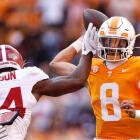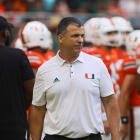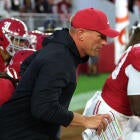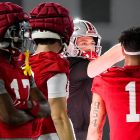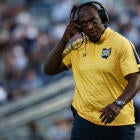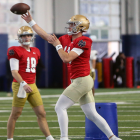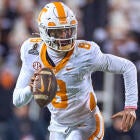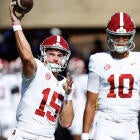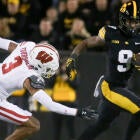
Back in 2012, a brilliant idea came to my mind. What if I could create a formula based on a quarterback's production in college that would give us an indication as to whether they would be successful at the NFL level?
Well, I failed.
It turns out there is no way to predict a QB's future based on past performance because there's so much more that goes into the position than the player. There's the environment, the surrounding team, the coaching staff and a lot of luck. However, while I've never been able to crack the QB code, I've continued using my formula every year since 2012 for a simple reason: It's done a decent job, even if it doesn't have all the answers.
Basically, the formula rates quarterbacks on throwing ability, not rushing. It's broke down into three categories: against top-50 defenses, third-and-long/fourth-down situations and the red zone. After shoving all those numbers into the machine, it spits out a score for each player. That score is then taken and compared to the average score of the quarterback class being graded, which is added to the list of all the quarterbacks rated in the past.
Before we dive into further detail, let's look at the scores for the 2024 class of quarterbacks.
| Rank | Quarterback | School | Fornelli Rating | 2023 Stats |
|---|---|---|---|---|
1. | Caleb Williams | USC | 8.98% | 3,633 yards, 30 TD, 5 INT |
2. | J.J. McCarthy | Michigan | 7.64% | 2,991 yards, 22 TD, 4 INT |
3. | Jayden Daniels | LSU | 2.93% | 3,812 yards, 40 TD, 4 INT |
4. | Spencer Rattler | South Carolina | 2.71% | 3,186 yards, 19 TD, 8 INT |
5. | Bo Nix | Oregon | 1.84% | 4,508 yards, 45 TD, 3 INT |
6. | Austin Reed | Western Kentucky | 0.71% | 3,340 yards, 31 TD, 11 INT |
7. | Drake Maye | North Carolina | 0.25% | 3,608 yards, 24 TD, 9 INT |
8. | Michael Penix | Washington | -0.26% | 4,903 yards, 36 TD, 11 INT |
9. | Sam Hartman | Notre Dame | -0.31% | 2,689 yards, 24 TD, 8 INT |
10. | Jordan Travis | Florida State | -0.32% | 2,756 yards, 20 TD, 2 INT |
11. | Devin Leary | Kentucky | -1.46% | 2,746 yards, 25 TD, 12 INT |
12. | Kedon Slovis | BYU | -2.76% | 1,716 yards, 12 TD, 6 INT |
13. | Michael Pratt | Tulane | -3.06% | 2,406 yards, 22 TD, 5 INT |
14. | Joe Milton | Tennessee | -3.38% | 2,813 yards, 20 TD, 5 INT |
The scoring is simple. Caleb Williams checks in with a score of 8.98%, which means his score was 8.98% better than the average score of the 14 quarterbacks listed. Joe Milton's score of -3.38% means he finished 3.38% below the average.
Of the 14 quarterbacks rated in this class, Williams and J.J. McCarthy are the only two to post scores that crack the top 20 of players graded since the 2012 class. Here's the top 20.
| Rank | Quarterback | Fornelli Rating |
|---|---|---|
1. | Tua Tagovailoa | 13.71% |
2. | Andrew Luck | 9.75% |
3. | Dwayne Haskins | 9.52% |
4. | Kyler Murray | 9.43% |
5. | Caleb Williams | 8.98% |
6. | Johnny Manziel | 8.98% |
7. | Robert Griffin | 8.67% |
8. | Baker Mayfield | 8.22% |
9. | Justin Fields | 8.12% |
10. | Mitch Trubisky | 8.11% |
11. | J.J. McCarthy | 7.64% |
12. | Jameis Winston | 6.88% |
13. | Sam Darnold | 6.50% |
14. | Marcus Mariota | 6.23% |
15. | Logan Woodside | 6.19% |
16. | Jared Goff | 5.62% |
17. | Patrick Mahomes | 5.57% |
18. | Jack Coan | 5.53% |
19. | D'Eriq King | 5.26% |
20. | Blake Bortles | 4.89% |
If you look at the top 20, your initial reaction is probably something along the lines of "OK, there are some decent names there, but outside of Patrick Mahomes, there aren't many greats in there."
Well, duh. There aren't many great quarterbacks in the NFL! There are only a handful in the league at any given time. That's why we consider them great!
The preferred focus here is on the fact that of the top 20, there are a lot more players who have gone on to have long NFL careers than there are busts. Even Mitch Trubisky and Marcus Mariota were still getting starts last season, while Sam Darnold could be in line for some himself this season.
Then there's the other end of the spectrum. If history is any indicator, you don't want your team drafting Michael Penix Jr. or any other players with below-average scores. The only players with below-average scores who have gone on to have exceptional NFL careers are Josh Allen and Lamar Jackson. What do they have in common? Both are excellent rushers, and this formula only rates players based on their passing. The jury is still out on other past below-average scorers like Anthony Richardson and Will Levis (I'll let fans pretend it's still out on Daniel Jones, Kenny Pickett and Desmond Ridder, too).
As for the players in this class, as many as five are expected to go in the first round. Let's go over the six players most often mocked in the first round with an explanation of where they were strongest and weakest and how it impacted their scores.
Caleb Williams
The numbers match the tape. The way Williams' 2024 season gets discussed, you'd think he had a horrible year. But then you look at the numbers, and he finished with 30 touchdowns to only five interceptions. It turns out that he was fine ... it was just the team that stunk. Anyway, it was a complete performance for Williams in the formula. His worst score came in third- and fourth-down situations, and it was the second-highest in the class. His performances against top defenses and in the red zone ranked the best in the class. There's a reason he's going No. 1 overall, but maybe Bears fans should temper their expectations. After all, while they didn't have top-five scores like Williams, Justin Fields and Mitch Trubisky are in the top 10 all-time. If either had worked out, it wouldn't be the Bears in position to draft Williams this year.
J.J. McCarthy
McCarthy's score is carried by two categories. He's second in the class behind Williams against top defenses, and his score in third- and fourth-down situations is the highest ever recorded in these rankings. It carried a lot of weight and helped offset that his red-zone performance ranked only sixth in the class. While it wasn't a bad score, the red-zone numbers were only slightly above average. That's worth monitoring because McCarthy has a strong arm, but red-zone plays do the best job of mirroring the kind of windows these players will be dealing with on every snap at the NFL level.
Jayden Daniels
Daniels didn't finish higher than third in any category, but he's one of those players who can slip through the cracks in these ratings. The Heisman Trophy winner's legs are a huge part of his game but, again, have no impact here. Plus, while Daniels was phenomenal in 2023, his entire career goes into these rankings, and the 2021 season was a bit of an anchor. The primary concern is his score in the red zone. It ranked ninth in the class and was below average all-time. He was great at hitting his receivers when there was a lot of field to work with, but as the field shrank, his arm wasn't nearly as effective.
Bo Nix
From an NFL perspective, the knock on Bo Nix will be his arm strength, which showed in his scores. Nix's scores against top-50 defenses -- and he had a large sample size thanks to his time in the SEC -- ranked third behind Williams and McCarthy, but he ranked fifth in third/fourth downs and seventh in the red zone. Nix threw a lot of short passes in the Oregon offense that allowed his receivers to do work after the catch. The performance suffered when he was forced to use his arm strength to keep the chains moving or put points on the board.
Drake Maye
Maye's score isn't complicated. His red-zone performance was terrible. He finished fifth in the class against top defenses and fourth on third and fourth downs. Both his scores were solidly above average all-time. But his red zone score ranked 13th -- well below average. Maye's accuracy suffered in the red zone, and he did not throw touchdowns at a high rate. His numbers dipped in 2023, but it's not like they were outstanding in 2022.
Michael Penix
It probably comes as a surprise given Penix's raw numbers and the explosiveness of the Washington offense in recent years, but when we looked under the hood, his numbers didn't match up well with the competition. He ranked eighth against top defenses, sixth in third- and fourth-down situations and eleventh in the red zone. Of those three, only his third/fourth-down score finished above average all-time (he was, like, a millimeter below average against top defenses). Like Maye, the red-zone score dragged him down.
Fornelli's actual QB Big Board
While the scores are a nice piece of data to use, they're just numbers at the end of the day. My name is on the rating, but my final QB board isn't based simply on these numbers. It's a combination of what we've seen from these players in college, how well their games translate to the NFL and their ceiling if they reach their full potential. With all that in mind, here's how my final QB big board looks ahead of the 2024 NFL Draft.
- Caleb Williams
- Drake Maye
- J.J. McCarthy
- Jayden Daniels
- Michael Penix
- Spencer Rattler
- Bo Nix
- Michael Pratt
If we were to tier them, Williams would be a tier unto himself. Then we'd have Maye, McCarthy and Daniels in a tier before getting to Nix, Penix, Rattler and the rest.
![[object Object] Logo](https://sportshub.cbsistatic.com/i/2020/04/22/e9ceb731-8b3f-4c60-98fe-090ab66a2997/screen-shot-2020-04-22-at-11-04-56-am.png)








